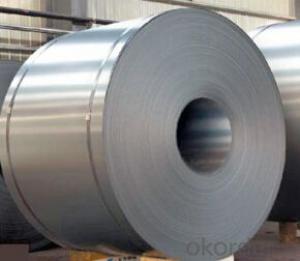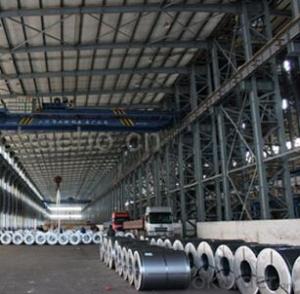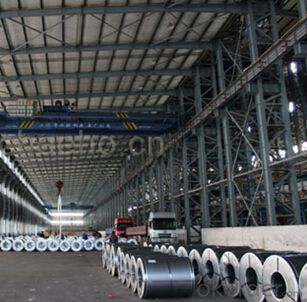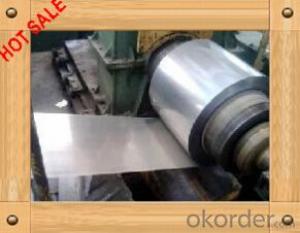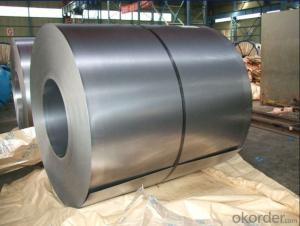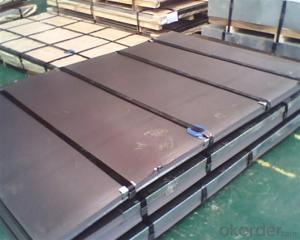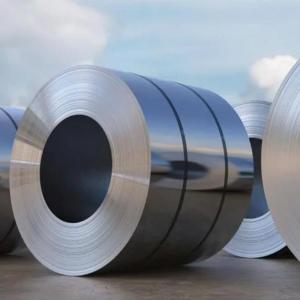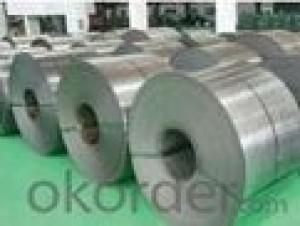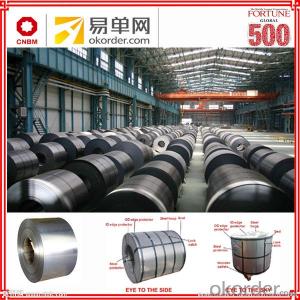Cold Rolled Steel (DC01) for Building Material
- Loading Port:
- Shanghai
- Payment Terms:
- TT OR LC
- Min Order Qty:
- 25 m.t.
- Supply Capability:
- 10000 m.t./month
OKorder Service Pledge
OKorder Financial Service
You Might Also Like
Basic Info.
Model NO.:Dc01
Technique:Cold Rolled
Standard:EN
Steel Grade:DC01
Export Markets:Global
Additional Info.
Trademark:CWG
Packing:Standard Seaworthy Packing, Bundle or Pallet
Standard:EN
Origin:China
HS Code:72099000
Product Description
1.Surface : General, Bright, Dull and Mirror finish, oiled or unoiled
2.Thickness: 0.1mm-3.5mm
3. Width:1000mm,1250mm, special width
4. Provide original mill test certificate and original production certificate of these standards
5. Coil ID: 508mm. 610mm
6. Coil weight: 4-15MT as per client's requirement
7. Trade term: FOB/ CIF/ CFR
8.Application:Construction filed, shiping building industry, petroleum&cheical industry, war and electricity industries, food processing and medical industry, boiler heat exchanger, machinery and hardware fileds.
Cold Rolled Steel is steel that has been worked below its recrystallization temperature by passing it between a pair of rollers. Recrystallization temperature is the temperature at which grains in the lattice structure of the metal have been rearranged, leaving it free of strain and deformations. Cold Rolled Steel is pre-treated before being cold rolled with a process known as pickling, which uses strong acids to remove scale and other impurities. The Cold Rolled Steel is then passed through rollers to reduce its thickness. Most cold rolling takes place in multiple passes and as the size of the Cold Rolled Steel is further reduced, its strength and hardness both increase, but its ductility decreases. After cold rolling, heating the metal up in a process known as annealing can restore some of its ductility. The final Cold Rolled Steel coil may be manufactured in the form of sheets, strips, bars, or other forms
- Q: How are steel coils secured during transportation?
- Steel coils are typically secured during transportation using steel strapping, bands, or wire rope. These securements help prevent the coils from shifting or falling off the transportation vehicle, ensuring their safe delivery to the destination.
- Q: I need to know where to go online to buy a steel cage for a wrestling ring.. Somebody please assist me?
- the only thing you can find is a bird cage because their is no way you can buy a steel cage unless you build it yourself
- Q: I'm currently in an Estimating and Bidding class. I have to estimate two divisions for a multi-million dollar project. The project that I chose is around 6 million dollars and involves constructing a new gas/lighting building. I chose to estimate steel, and my question is, around how much out of the 6 million goes toward just the steel estimate? If it helps, this building is has two floors and is roughly about 100x70 feet. The building not wood construction, but rather steel and brick. How much of that 6 million would go into the steel? I'm not looking for anything exact, just roughly.
- It is not clear what stage this project is in. Is it preliminary or has a detailed design been done. It is also not clear if this is only the steel material or does it include the labor as well. A rough guess using a percentage of the total cost is okay if you have historical data to help you. If you have a detailed design then the percentage method should only be used as a check on a detailed cost estimate developed from the plans. If you plan to use numbers provided by someone here on Answers I would hardly call that an estimate.
- Q: What are the dimensions of steel coils used in the electrical equipment industry?
- The dimensions of steel coils used in the electrical equipment industry can vary depending on the specific application and requirements of the equipment being manufactured. However, there are some common dimensions that are frequently used in this industry. Typically, the width of steel coils used in electrical equipment manufacturing ranges from 0.5 inches to 72 inches (1.27 cm to 182.88 cm). The thickness of these coils can vary from as thin as 0.005 inches (0.0127 cm) to as thick as 0.25 inches (0.635 cm). The length of steel coils used in the electrical equipment industry can also vary, but it is often determined by the manufacturing process and the specific equipment being produced. Coils can range from a few feet to several hundred feet in length. Furthermore, the weight of steel coils can vary depending on their dimensions and the type of steel being used. For instance, a common weight range for steel coils used in the electrical equipment industry is between 5,000 pounds (2,268 kg) and 50,000 pounds (22,680 kg). It is important to note that these dimensions are not fixed and can vary based on the specific needs of the electrical equipment industry. Manufacturers may have their own unique specifications and requirements for the steel coils they use in their products.
- Q: What are the main steel coil producing countries?
- The main steel coil producing countries are China, Japan, India, the United States, and Russia.
- Q: Can steel coils be used in electrical applications?
- Yes, steel coils can be used in electrical applications. Steel coils are often used as magnetic cores in transformers and inductors, which are essential components in electrical circuits. The steel used in these coils is typically a type of high-quality electrical steel that has specific magnetic properties, such as low core losses and high permeability. These properties allow the steel coils to efficiently transfer electrical energy between different components of the circuit. Additionally, steel coils can also be used in other electrical applications, such as in the construction of electric motors and generators. Overall, steel coils are widely utilized in electrical applications due to their magnetic properties and their ability to handle high currents and temperatures.
- Q: I know that it is used for katanas and swords but what is it and is it good i am pretty sure that it is the process of the steel but can I have a little more information.
- Damascus or Wootz was a type of steel that appeared around 300BC It originated in India before spreading throughout Asia and the Middle East. It was considered a good steel, and for it's date of origin, exceptionally advanced for the level of technology in the ancient world. However the techniques to create the steel were lost forever after a decline in the swords manufacturing. The most popular theory is that the metal containing the required trace elements became less available over time due to unreliable trade routes. In the modern area, many scientists and metallurgists have studied the surviving blades, resulting in many discoveries such as evidence of carbon molecules fused in a crystalline structure. While the blades do provide some clues, it's only a small part of a much bigger picture as to the full process of the metal from raw to finished product. Now many have claimed to have recreated Damascus/Wootz steel, but none are recognised as being authentic. It has become a market ploy these days that draws people to purchasing the blades but all you are actually seeing is one of the many various forms of folded or patterned steel, which has varying degrees of quality, strength etc. We do know the steel was folded similar to the way the Japanese did in creation of old Katana, so often people will sell Damascus steel Katana that are nothing but folded steel swords like others. (Which is beautiful and traditional, but was a process designed to uniform impurities in the metal, something we no longer need to do with modern metals)
- Q: Search the internet for 'Frost Clipper Knife'. This knife comes in either stainless or carbon steel. I have a friend who has one (stainless steel) and he is very impressed with it, but I have heard that Carbon Steel blades are better? Discuss...
- If your talking about a folding pocket knife, I think that it's basically six one way and a half dozen the other. I actually do prefer stainless for my pocket knives. I don't want to oil a knife to the degree I feel carbon requires, only to then stick it my pocket to attract dirt to the knife and oil to my pants. I'm the exact opposite on sheath knives though. I like 1095 carbon steel, plain edge sheath knives. I'll thrash on them HARD, and I rarely have major edge problems. Of course, I require them to be coated with some kind of powder coat or the like, because they can rust, but I do try and keep them clean and dry when in the sheath, so they won't pit the uncoated edge. My reasons for this sheath knife preference is multi-fold. First, these knives are simply affordable. I don't spend $80 dollars on a outdoors sheath knife. I use the tool too hard to want to spend more. I don't like the more traditional stainless steels such as AUS-8, 420HC, and 440C (not to mention the HORRENDOUS 440A) because I feel that the all else being equal, a stainless blade will bend before a carbon blade will break. I also think that carbon holds an edge at least as well, if not better, than traditional stainless, and it's much easier to hone. I don't know much about these new laminates, other than the very hard, but not so tough. They seem to be POSSIBLY too brittle for my use. That, combined with the fact that they cost a FORTUNE, means that I just won't be considering them.
- Q: Personally, I like Steel Cage matches to end in pinfalls. One of the biggest selling points of a Cage match is that it is to keep the competitors in and keep others out; essentially ensuring that it's a 1 on 1 match. As a result, I believe that pinfalls or submissions are important - but I know there's a lot of people that believe cage matches should only end in escape. What do you think??
- I don't really care either way. The only way I don't like it to end is when the door is opened and the person just walks out. That really isn't hard to win it like that. For last night I was hoping before the match that Bryan would win by escaping the cage. It fit his character, being a coward champ.
- Q: Can steel coils be used in the production of packaging materials?
- Certainly, packaging materials can indeed utilize steel coils. Frequently, steel coils serve as the primary material in packaging items like metal strapping and steel banding. These coils possess remarkable strength, durability, and exceptional tensile strength, rendering them perfectly suitable for effectively securing and safeguarding diverse products throughout their transportation and storage. Furthermore, steel coils can be effortlessly molded and fashioned into various packaging elements, guaranteeing a dependable and secure packaging solution for an extensive array of industries.
Send your message to us
Cold Rolled Steel (DC01) for Building Material
- Loading Port:
- Shanghai
- Payment Terms:
- TT OR LC
- Min Order Qty:
- 25 m.t.
- Supply Capability:
- 10000 m.t./month
OKorder Service Pledge
OKorder Financial Service
Similar products
Hot products
Hot Searches
Related keywords
